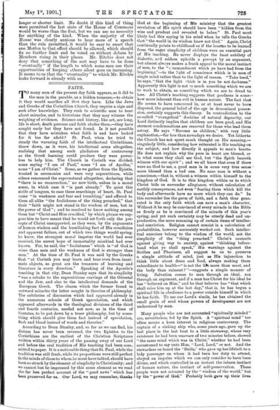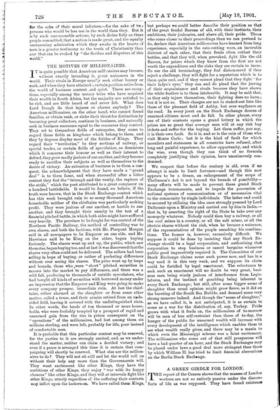FAITH.
TO many men of the present day faith appears, as it did to the man in the parable, as a hidden treasure,—to obtain it they would sacrifice all thst they have. Like the Jews and Greeks of the Corinthian Church, they require a sign and seek after knowledge. They rush to scientific men to hear about miracles, and to historians that they may witness the weighing of evidence. Science and history, like art, are long, life is short, death pursues and faith eludes them,—they have sought early but they have not found. Is it not possible that they have mistaken what faith is and have looked for it too far afield ? St. Paul, when he tried to steady the wavering faith of the intellectual Corinthians, threw down, as it were, his intellectual arms altogether, realising that among such gladiators of controversy as the Greek learning could produce they were power- less to help him. The Church in Corinth was divided, some saying "I am of Paul," some "I am of Apollos," some "I am of Christ." Some, as we gather from the Epistle, trusted in ceremonies and were very superstitious, while others renounced the supernatural altogether, declaring that "there is no resurrection," no new birth, unless in a moral sense, in which case it "is past already." To quiet this strife of tongues, to ease these searchings of heart, St. Paul came "in weakness and fear and trembling," and offered to them all alike "the foolishness of the thing preached," that their "faith might not stand in the wisdom of men, but in the power of God"; and he resolved to know nothing among them but "Christ and Him crucified," by which phrase we sup- pose him to have meant that he would set forth only the pre- cepts of Christ unsupported, as they were, by the arguments of human wisdom and the humiliating fact of His crucifixion and apparent failure, out of which two things would spring, he knew, the strongest moral impetus the world had ever received, the surest hope of immortality mankind had ever knawn. For, he said, the " foolishness " which is "of God is wiser than men and the weakness of God is stronger than men." At the time of St. Paul it was said by the Greeks that "at Corinth you may learn and hear even from inani- mate objects, so great are the treasures of learning and literature in every direction." Speaking of the Apostle's teaching in that city, Dean Stanley says that its simplicity "was a rebuke to the superstitious cravings of the Oriental and the Jew, and also to the intellectual demands of the European Greek. The charm which the former found in outward miracles the latter sought in theories of philosophy. The subtleties of discussion which had appeared already in the numerous schools of Greek speculation, and which appeared afterwards in the theological divisions of the third and fourth centuries, needed not now, as in the time of Socrates, to be put down by a truer philosophy, but by some- thing which should give them fact instead of speculation, flesh and blood instead of words and theories."
According to Dean Stanley, and, so far as we can find, his dictum has never been reversed, the two Epistles to the Corinthians are the earliest of the Christian Scriptures written within thirty years of the passing away of our Lord and before the oral tradition of His teaching had been com- mitted to paper. It is a noticeable thing that St. Paul, while the tradition was still fresh, while its proportions were still perfect in the minds of those to whom he must have talked, should have been so struck by the element of simplicity in Christianity; and we cannot but be impressed by this same element as we read the fax less perfect account of the "good nevis " which has been preserved for us. Our Lord, we may remember, thanks God at the beginning of His ministry that the greatest revelation of His spirit should have been "hidden from the wise and prudent and revealed to babes." St. Paul most likely had this saying in his mind when he tells the Greeks that "the world in its wisdom knew not God." 'Again, Christ continually points to childhood as if the lessen:Is to be learne8 from the eager simplicity of children were an essential part of His teaching. He never displays the least subtlety of dialectic, at.4:1 seldom upholds a precept by an argument but almost always makes a frank appeal to the moral instinct of men, to the " Limmandment which ye have had from the beginning,"—to the 1;ght of conscience which is in men of single mind rather than to the light of reason. "Take heed," he says, "that the light Yhich is in you be not darkness." Apparently this light is not so much something which we are to work to obtain, as something which we are to dread to lose. All Christ's teaching suggests that goodness is some..., how more inherent than evil in human nature. The fact that He seems to have concurred in, or at least never to have disputed, the general belief of the age in demoniacal possed- sion, certainly supports this theory. In contradiction to the so-called "evangelical" doctrine of natural depravity, our Lord distinctly implies that children are born good, and His sternest condemnations are reserved for those who lead them astray. He says "Become as children," with very, little explanation,—far less than nowadays we desire. Yet hitherto the Church has not spent much thought on His meaning,— singularly little, considering how reiterated is His teaching on the subject, and how directly it appeals to men's hearts. He does not explain why the pure in heart are blessed, or in what sense they shall see God, but "the Spirit beareth witness with our spirit " ; and we all know that even if there were no God to see, a good man is in some very true sense more blessed than a bad one. No sane man is without a conscience,—that is, without a witness within himself to the kingdom of God. It is to this kingdom within us to which Christ bids us surrender allegiance, without calculation of earthly consequences, not even "fearing them which kill the body and afterwards have no more which they can do." In this surrender lies the germ of faith, and a faith thus gene. rated is the only faith which can save a man's character, Without it he may be convinced of every miracle in the Bible as firmly 82 he is convinced of the miracle of this year's spring, and yet such certainty may be utterly dead and un- productive, the mere summing up of certain items of intellec- tual conviction. Religion cannot consist in a calculation of probabilities, however accurately worked out. Such intellec- tual exercises belong to the wisdom of the world; not the simplicity of the "thing preached." Christ's counsels against giving way to anxiety, against "thinking before- hand what ye shall speak," His warnings against the Scribes and Pharisees, all suggest to us to, preserve a simple attitude of mind, just as His injunction to think little about dress and food, always making them subordinate to health—" is not the life more than meat, and the body than raiment ? "—suggests a simple matuier of living. Salvation comes to men through an ideal, not through an argument, and if a man has Christ for his ideal he has "believed on Him," and he that believes has "that which shall raise him up at the last day," that is, he has begun a spiritual life in obedience to a power outside himself in which he has faith. To use our Lord's simile, he has obtained the small grain of seed whose powers of development are not understood by man.
Many people who are not accounted "spiritually thinded" are, nevertheless, led by the Spirit. A "spiritual mind" too often means a keen interest in religious controversy. The captain of a sinking ship who, some years ago, gave up the last place in the last boat to a little stowaway, whose very existence he had been unaware of two minutes before, showed' "the same mind which was in Christ," whether he had been accustomed to say unto Him, "Lord, Lord," or not. And the stewardess on board the Stella,' who gave up her lifebelt to a lady passenger on whom it had been her duty to attend, obeyed an impulse which we can only consider to have been divine, and which controlled in an instant the inborn instinct' of human nature, the instinct of self-preservation. These people were not actuated by the "wisdom of the world," but by the" power of God." Probably both gave up their lives
for the sake of their moral inferiors,—for the sake of tvp persons who would be less use in the world than they. But it is by such unreasonable actions, by such divine folly as these people committed, that a nation is made great, and the equally unreasoning admiration which they awake in the hearts cf men is a greater testimony to the truth of Christianity than any that can he evoked by "the Scribes and disputers of this world."







































 Previous page
Previous page